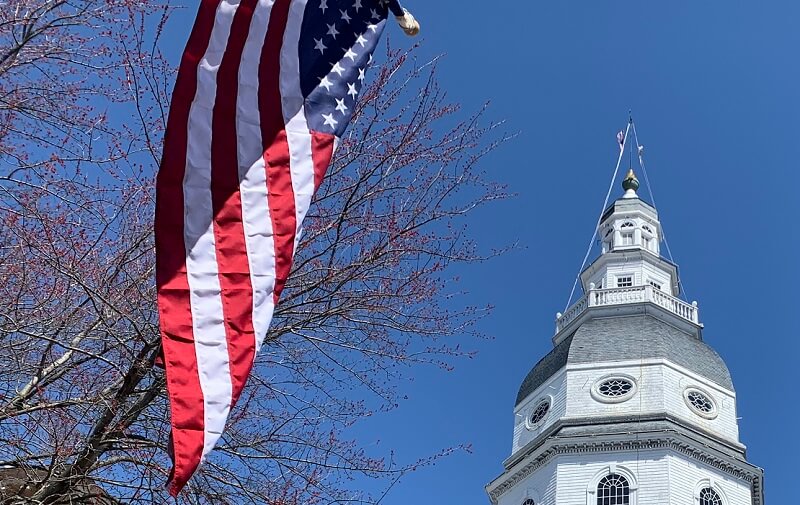House Committee Divided Over Hogan’s Ending Expanded Unemployment Benefits

Some Maryland delegates pushed back Tuesday against the governor’s recent decision to end expanded unemployment benefits two months early without evidence that it would lead to job gains.
“I don’t disagree that there are more jobs available; I don’t disagree that there are challenges in getting people into those jobs…but there doesn’t seem to be any behavioral economics or macroeconomic analysis that suggests that this decision is going to help people get into those jobs,” Del. Lorig Charkoudian (D-Montgomery) said during a House Economic Matters Committee briefing on the issue.
Ending extended benefits two months early means that the state will forfeit $1.5 billion in additional federal stimulus money, lawmakers said.
“At what cost do you want to take that sort of partisan ideological point? At a cost of $1.5 billion to the state — it just seems really dangerous,” Charkoudian continued.
Last week, Gov. Lawrence J. Hogan Jr. (R) joined two dozen Republican-led states in ending enhanced unemployment benefits in July, contending that Maryland’s economy is improving but businesses are facing “severe worker shortages.”
Starting July 3, Maryland will end its $300 supplemental weekly payment under the Federal Pandemic Unemployment Compensation program and $100-per-week payments for “mixed earners,” usually gig workers who have multiple sources of income.
The Pandemic Emergency Unemployment Compensation for long-term unemployed who have exhausted regular benefits, and the Pandemic Unemployment Assistance for self-employed or independent contractors who are ineligible for traditional unemployment assistance, will also end.
These federal programs, based on an agreement between the state and the U.S. Department of Labor, were extended until September under the American Rescue Plan, Zach Herman of the National Conference of State Legislatures told committee members. So far, 25 Republican-led states have announced that they will opt out of them early in the coming weeks.
Shortly after Hogan’s decision last week, legislative leaders sought advice from Attorney General Brian E. Frosh (D) about a possible special session and whether the legislature could overturn Hogan’s decision.
Del. Dereck E. Davis (D-Prince George’s), chair of the Economic Matters Committee, called Hogan’s decision “disingenuous” to Marylanders depending on those benefits. “It was announced when it was going to end, and then we switched the dates up…we could have waited two more months,” Davis said.
Already, 71% of adults in the state are at least partially vaccinated and the rate of positive COVID-19 tests is under 2% in 18 of 24 jurisdictions, said Keiffer Mitchell, Hogan’s chief legislative officer.
Business owners across the state have told Hogan that it has been difficult for them to hire workers, and the governor has dedicated $75 million to apprenticeship and employment training in the budget passed this year, Mitchell continued.
Maryland Secretary of Labor Tiffany P. Robinson said the state’s unemployment rate remains at 6.2%.
Charkoudian cited a University of Chicago study, published in February, which concluded that, after a large benefit expansion, followed by a period when those benefits expire, “the job-finding rate is quite stable.”
Charkoudian also pointed to a study by the National Bureau of Economic Research which concluded that states with more generous unemployment insurance benefits had milder declines and faster recoveries. The report also found no evidence that high unemployment insurance replacement rates (the ratio of a claimant’s weekly benefit compared to their average wages) drove job losses or slowed rehiring.
Mitchell stressed that Hogan did not make the decision to end expanded federal unemployment benefits early “in a vacuum.”
He said Hogan used National Labor Statistics from the Department of Commerce, as well as data from the Department of Labor.
When asked whether any data showed that states that opted out of federal money are getting more jobs filled, Herman said he was unaware of any statistics on that issue.
Charkoudian noted that House Bill 1002, which passed the General Assembly this year without the governor’s signature, requires the Maryland Department of Labor to look at all federal regulations and guidance that expand access to unemployment benefits in an effort to reduce bureaucratic hurdles.
“The legislature was clearly directing the Department of Labor to go in the expansive direction to maximize the amount of federal money that we were bringing into the state,” Charkoudian said. She asked if the bill was considered while the governor’s office made its decision.
“I’m not going to get into … meeting topics or the discussions that we have with the governor regarding this,” Mitchell said.
Del. Jesse Pippy (R-Carroll and Frederick) said there is not a day he does not hear from local businesses that are having difficulty finding employees. “At some point, less is more,” he said. “If you’re incentivizing people not to work when there is a need for employees, we’re going to have other problems.”
Robinson told the committee that the Department of Labor has prepared a one-page list of workforce resources.
“Rather than focusing on the loss of this one enhanced unemployment benefit, it would be more beneficial for the General Assembly to instead spend its time advocating and promoting the numerous programs the Department of Labor has created to get people back to work,” House Minority Whip Christopher T. Adams (R-Middle Shore) said in a written statement issued after the briefing.
“COVID-19 infection rates are at historic lows and businesses are in a hiring frenzy. It is time to get people back to work,” he continued.
Unemployed Marylanders must file their final weekly claim certification through BEACON, the state’s unemployment portal, anytime from July 4 to July 10 to receive payment for the final week that ends July 3, Robinson said.
But if a claimant is waiting to be deemed eligible for unemployment insurance benefits, even after July 3, they will receive all benefit payments owed to them, Robinson said.
Maryland will reinstate work search requirements beginning July 4, but it will be more flexible than before the pandemic, Robinson said. Unemployed Marylanders would need to complete three reemployment activities — such as applying for jobs or completing a job training workshop — on a weekly basis to maintain their eligibility for benefits, she said.
At least four states — Arizona, Montana, New Hampshire and Oklahoma — are opting out of some or all federal benefits, but are also offering return-to-work bonuses, said Herman of NCSL.
Perhaps Maryland could offer similar return-to-work bonuses, Davis said.
Some delegates also pressed the state Department of Labor on their unresponsiveness to people who have had trouble getting unemployment payments or who have had false claims filed in their names.
Del. Kathleen M. Dumais (D-Montgomery) said some Marylanders have been trying to reach the state Department of Labor to report fraudulent claims, but have received no response.
Charkoudian said many of her constituents have not received their unemployment benefits and have not gotten responses from the Department of Labor.
Robinson said those constituents should contact their case managers, who check in with their clients once a week.
Charkoudian said some of her most frustrated constituents are not hearing from their case managers weekly.
Some people probably are receiving unemployment benefits and need to be encouraged to search for work, but the pandemic is not over and there are remaining complications, such as figuring out child care, said Del. M. Courtney Watson (D-Howard).
This issue “is not one size fits all, but the decision is being made that way — it was abrupt; it has a very short off-ramp, and it does nothing to address the disproportionate impact on women who are primary caregivers for children who are impacted by the pandemic and are not vaccinated,” she said.




 Creative Commons Attribution
Creative Commons Attribution